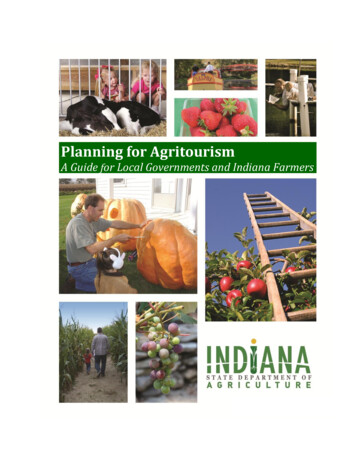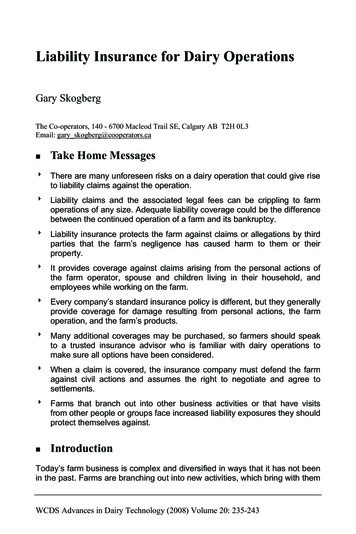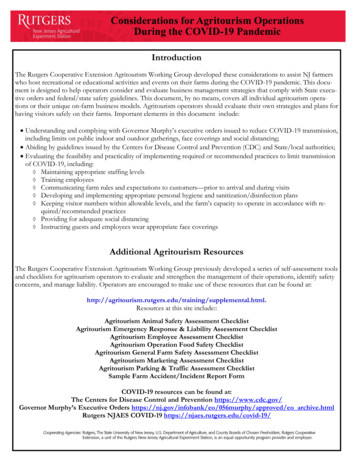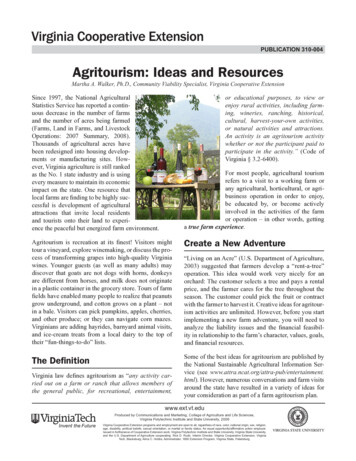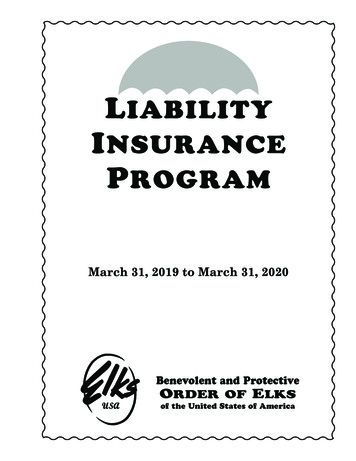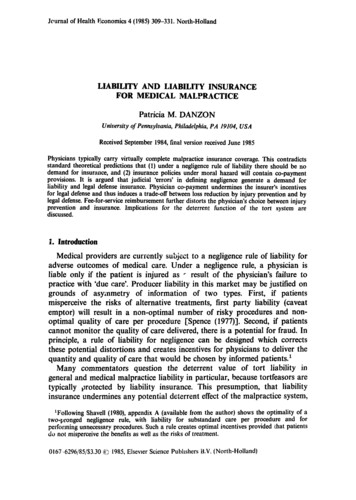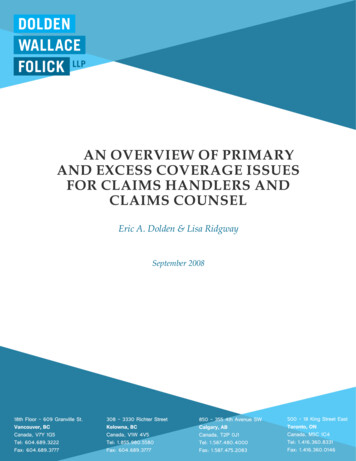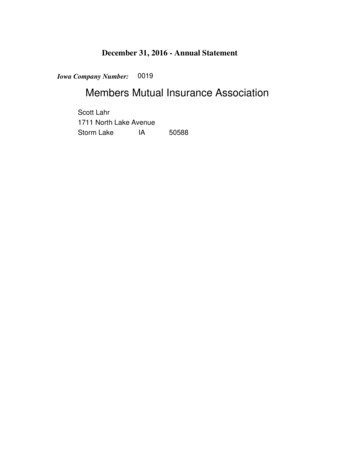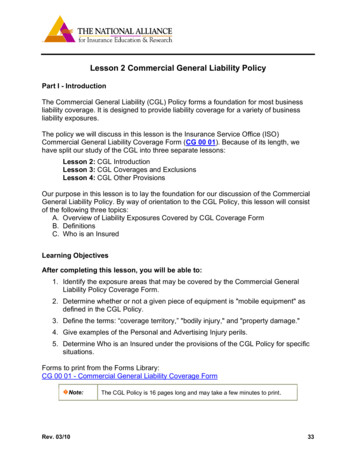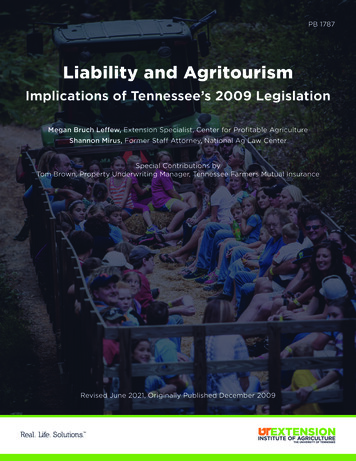
Transcription
PB 1787Liability and AgritourismImplications of Tennessee’s 2009 LegislationMegan Bruch Leffew, Extension Specialist, Center for Profitable AgricultureShannon Mirus, Former Staff Attorney, National Ag Law CenterSpecial Contributions byTom Brown, Property Underwriting Manager, Tennessee Farmers Mutual InsuranceRevised June 2021, Originally Published December 2009Liability and Agritourism: Implications of Tennessee’s 2009 Legislation1
DisclaimerThis publication is for educational purposes only and does notconstitute legal advice nor is it intended to be a substitute for theservices of a competent legal professional.Photo credit: Grandaddy’s Farm in Estill Springs, TNAcknowledgmentsDevelopment of the original publication produced in December 2009was funded, in part, by the American Recovery & Reinvestment Act.Special appreciation is extended to the following people who providedthe professional peer review of the original publication: Chris Clark, University of Tennessee, Department ofAgricultural Economics Alan Galloway, UT Extension Ed Lancaster, Tennessee Farm Bureau Federation Rhedona Rose, Tennessee Farm Bureau Federation
Table of ContentsIntroduction1Text of T.C.A. § 43-392Interpretation and Implications ofthe Legislation6What does the law say?6To whom does the statute apply?7What are the requirements of the law?7Is a sign needed at every attraction?7Will this law stop people from suing me?8Do agritourism operators still needliability insurance?9Does the law impact premiums onliability insurance?9How do I know if my farm is eligible forgreenbelt classification?9Is there anything agritourism operators can doto reduce their liability risk in concert with theliability law?10Additional Resources11The Center for Profitable Agriculture11The National Agricultural Law Center11SummaryLiability and Agritourism: Implications of Tennessee’s 2009 Legislation12
Photo credit: Grandaddy’s Farm in Estill Springs, TNIntroductionAgritourism is a growing industry in Tennessee, as farmers seeknew enterprises to generate revenue and consumers seek educationaland recreational opportunities or farm-fresh products. A combinationof agriculture and tourism, agritourism creates opportunities as wellas challenges.Liability is a significant concern for farmers who operate agritourismenterprises. A landowner who opens his or her land to the public facesthe risk that he or she could be considered liable if someone is injuredwhile on the property.Several states have enacted legislation to limit the liability of agritourismoperators with regard to the dangers, hazards or conditions inherent totheir agritourism activities. In February 2009, House Bill 1931 addressingagritourism liability was introduced into the Tennessee legislature andwas quickly followed by Senate Bill 2164. The bills were passed followingamendment and were signed into law as T.C.A. § 43-39 by Governor PhilBredesen. The law was enacted on July 1, 2009.As farmers explore agritourism for their farms, liability is of majorconcern. This publication includes the text of the Tennessee agritourismliability law and discusses some implications of the legislation foragritourism operators in the state.1
Text of T.C.A. § 43-39The following is the text of T.C.A. § 43-39 current through the 2020Regular and Second Extraordinary Legislative Sessions as found onLexisNexis.43-39-101. Chapter Definitions.For purposes of this chapter, unless the context otherwise requires:(1) “Agritourism activity” means any activity carried out on a farm orranch, eligible for greenbelt classification under title 67, chapter 5,part 10, that allows members of the general public, for recreational,entertainment or educational purposes, to view or enjoy ruralactivities, including farming, ranching, historic, cultural, harvestyour-own activities or natural activities and attractions. An activityis an “agritourism activity” whether or not a participant providescompensation in money or other valuable compensation toparticipate in the activity. “Agritourism activity” includes an activityinvolving any animal exhibition at an agricultural fair, regardless ofthe location of the fair;(2) “Agritourism professional” means any person who is engaged inthe business of providing one (1) or more agritourism activities,whether or not for compensation;(3)(A) “Inherent risks of agritourism activity” means those dangers,conditions or hazards that are an integral part of an agritourismactivity, including, but not limited to:(i) Surface and subsurface conditions;(ii) Natural conditions of land, vegetation and waters;(iii) The behavior of wild or domestic animals; and(iv) Ordinary dangers of structures or equipment ordinarily usedin farming and ranching operations.(B) “Inherent risks of agritourism activity” also include thepotential of a participant to act in a negligent manner that maycontribute to injury to the participant or others, including failingto follow instructions given by an agritourism professional orfailing to exercise reasonable caution while engaging in anagritourism activity;Liability and Agritourism: Implications of Tennessee’s 2009 Legislation2
(4) “Participant” means any person, other than the agritourismprofessional, who engages in an agritourism activity; and(5) “Person” means an individual, fiduciary, firm, association,partnership, limited liability company, corporation, unit ofgovernment or any other group acting as a unit.43-39-102. Immunity from liability for injury or death.(a) Except as provided in subsection (b):(1) No agritourism professional is liable for injury to or death of aparticipant, or damage to a participant’s property, resulting solelyfrom the inherent risks of agritourism activities, as long as thewarning contained in § 43-39-103(b) is posted as required; and(2) A participant or participant’s representative shall not maintainan action against or recover from an agritourism professionalfor injury, loss, damage, including, but not limited to propertydamage, or death of the participant resulting exclusively from anyof the inherent risks of agritourism activities.(b) Nothing in subsection (a) prevents or limits the liability of anagritourism professional if the agritourism professional or any of itsagents does any one (1) or more of the following:(1) Commits an act or omission that constitutes reckless disregardfor the safety of the participant or the participant’s property, andthat act or omission proximately causes injury, damage, or deathto the participant, or damage to the participant’s property;(2) Has actual knowledge or reasonably should have known of adangerous condition on the land, facilities, or equipment used inthe activity or the dangerous propensity of a particular animalused in the activity and does not make the danger known to theparticipant, and the danger proximately causes injury, damage, ordeath to the participant, or damage to the participant’s property;(3) Fails to train, or improperly or inadequately trains, employeeswho are actively involved in agritourism activities, and an act oromission of the employee proximately causes injury, damage, ordeath to the participant, or damage to the participant’s property;(4) Intentionally injures the participant, or damages the participant’sproperty; or3
Photo credit: Grandaddy’s Farm in Estill Springs, TN(5) Commits any other act, error, or omission that constitutes willfulor wanton misconduct, gross negligence, or criminal conduct.(c) Nothing in subsection (a):(1) Prevents or limits the liability of an agritourism professional underthe product liability provisions in title 29, chapter 28; or(2) Shall be construed so as to negate that assumption of the risk isan affirmative defense.(d) Any limitation on legal liability afforded by this section to anagritourism professional is in addition to any other limitations oflegal liability otherwise provided by law.Liability and Agritourism: Implications of Tennessee’s 2009 Legislation4
43-39-103. Warning notice.(a)(1) Every agritourism professional shall post and maintain a sign thatcontains the warning notice specified in subsection (b). The signshall be placed in a clearly visible location at the entrance to theagritourism location and at the site of the agritourism activity.The warning notice shall consist of a sign in black letters, witheach letter to be a minimum of one inch (1”) in height.(2) Every written contract entered into by an agritourismprofessional for the providing of professional services, instructionor the rental of equipment to a participant for purposes ofengaging in or participating in an agritourism activity, whether ornot the contract involves agritourism activities on or off the siteof the agritourism activity, shall contain in clearly readable printthe warning notice specified in subsection (b).(b) The signs and contracts described in subsection (a) shall containthe following language or substantially similar language:WARNINGUnder Tennessee law, there is no liability for an injury to or death of aparticipant, or damage to the property of a participant, in an agritourismactivity conducted at this agritourism location or by this agritourismprofessional if such injury, death, or property damage results from the inherentrisks of the agritourism activity.Inherent risks of agritourism activities include, among others, risks of injuryand damage inherent to land, equipment, and animals, as well as the potentialfor you to act in a negligent manner that may contribute to your injury ordeath or to the damaging of your own property. You are assuming the risk ofparticipating in this agritourism activity.(c) Failure to comply with this section shall prevent an agritourismprofessional from invoking the privileges of immunity provided bythis chapter.5
Interpretation and Implications of the LegislationSeveral questions arise when considering what the law means and howit applies to agritourism operations. This section includes discussion onmany of those questions including: What does the law say? To whom does the statue apply? What are the requirements of the law? Is a sign needed at every attraction? Will this law stop people from suing me? Do agritourism operators still need liability insurance? Does the law impact premiums on liability insurance? How do I know if my farm is eligible for greenbelt classification? Is there anything agritourism operators can do to reduce their liabilityrisk under the new law?What does the law say?The new statute defines several terms including what qualifies as anagritourism activity, who is an agritourism professional, what is aninherent risk of an agritourism activity and who is a participant. The lawis intended to limit the liability of agritourism professionals for injuriesthat result from inherent risks. The inherent risks are those conditionsthat are considered beyond the control of the agritourism professional.The statute defines inherent risks as “those dangers, conditions orhazards that are an integral part of an agritourism activity.” Theseinclude the natural condition of the land, vegetation or water;behavior of wild or domestic animals; ordinary dangers of equipmentor structures used in farming and ranching; and the potential for aparticipant to act negligently. According to the statute, if a participantis injured by any of these “inherent conditions” then the agritourismprofessional is not liable for related injuries. This does not mean that anagritourism professional will never be held liable for an injury, just thatthere is a statutory limit on liability in certain circumstances.Liability and Agritourism: Implications of Tennessee’s 2009 Legislation6
To whom does the statute apply?This law applies to agritourism activities and agritourismprofessionals as defined in the statute. This means that the lawcovers farms or ranches eligible for greenbelt certification providingone or more agritourism activities. It also covers animal exhibitionsat agricultural fairs.What are the requirements of the law?For the liability protections to apply, a landowner or operator mustfirst qualify as an agritourism professional and provide an agritourismactivity. Additionally, the agritourism professional must post andmaintain warning signs at the entrance of the agritourism locationand at every agritourism activity. The warning sign must be printed inblack letters at least one inch tall. The warning must also be includedin any contracts entered into by the agritourism professional for rentalof equipment, instruction, or other professional services offered by theagritourism professional. The warning required on signs and contracts isas follows:WARNINGUnder Tennessee law, there is no liability for an injury to or death of a participantin an agritourism activity conducted at this agritourism location or by this agritourismprofessional if such injury or death results from the inherent risks of the agritourismactivity. Inherent risks of agritourism activities include, among others, risks ofinjury inherent to land, equipment, and animals, as well as the potential for you to actin a negligent manner that may contribute to your injury or death. You are assumingthe risk of participating in this agritourism activity.If the warning signs are not posted or the required language is notincluded in contracts, the agritourism professional will not be protectedby the limited liability law.Is a sign needed at every attraction?The law says, “The sign shall be placed in a clearly visible location at theentrance to the agritourism location and at the site of the agritourismactivity.” While it may seem excessive to put a sign at every activity,it may be one of those times to consider being safe rather than sorry.Something as minor as not having a sign at an activity may make thelaw ineffective. The law says, “Failure to comply with this section (sign7
requirement) shall prevent an agritourism professional from invoking theprivileges of immunity provided by this chapter.”Some states have found it reasonable for operators to post signs atthe entrance(s) to specific activity areas such as the “Animal Barnyard”instead of having a sign at each separate animal pen or exhibit. Foroperators where activities are grouped into special activity areas, thismay be a viable option.Will this law stop people from suing me?No, the law will probably not prevent people from filing a suit againstyou. It may help you in several other ways, however. First, the lawprevents an agritourism professional from being held liable for injuryto or death of a participant caused by inherent risks of agritourismactivities. This does not stop someone from filing a suit against youif they are injured, but it does require them to prove their injury wascaused by something other than an inherent risk of the activity to beable to recover damages from you.You may still be liable for any injuries to participants. The limitation onliability does not apply in five specific situations: (1) The agritourismprofessional or employee acts with reckless disregard, or withoutconcern, for the safety of the participant. (2) The agritourismprofessional or employee has knowledge of or should have known aboutLiability and Agritourism: Implications of Tennessee’s 2009 Legislation8
a dangerous condition and does not share that information with theparticipants. (3) The agritourism professional fails to train, or improperlyor inadequately trains employees. (4) The agritourism professionalor employee intentionally injures the participant. (5) The agritourismprofessional or employee commits any act, error or omission that isconsidered willful or wanton misconduct, gross negligence or criminalconduct. These are generally situations that are within the control of theagritourism professional compared to inherent risks, which are not.Do agritourism operators still need liability insurance?Yes, operators should purchase liability insurance as part of theirrisk management strategy. The law is not a replacement for insurance.The law only provides protection in limited circumstances and does notstop an injured participant from filing suit in an attempt to recover froman agritourism professional. Most insurance policies include “duty todefend” clauses, which means that the insurance company will pay todefend an agritourism professional if a suit is filed against them.Does the law impact premiums on liability insurance?When the law was passed, there was some thought that the numberof claims and funds paid out by insurance companies may be reducedand, therefore, insurance premiums may eventually decrease. Insurancepremium rates are based in large part on prior loss history. Theinsurance industry has not seen a significant reduction in the numberof claims or pay outs overall to date, so thus far, insurance premiumshave not been impacted by the law.How do I know if my farm is eligible for greenbeltclassification?The law defines an agritourism activity for the purpose of the law,in part, as a farm or ranch that is eligible for greenbelt classification.Greenbelt refers to a classification system related to property taxassessment in Tennessee made possible through the Agricultural, Forestand Open Space Land Act of 1976. It allows for eligible agricultural,forest and open space land to be taxed based on use value rather thanon fair market value.¹¹ Learn more about the Agricultural, Forest and Open Space Land Act of 1976, commonly known as"greenbelt" on the Tennessee Comptroller of the Treasury website: qualization/sboe-services/greenbelt0.html.9
The greenbelt law requires that “agricultural” land be part of a farmunit of at least 15 acres including woodlands and waste-lands that is“engaged in the production of growing crops, plants, animals, nursery,or floral products.” The statute also allows a 10-acre tract to qualify ifthe same owner has already qualified a 15-acre tract and both tractsconstitute a farm unit being used for the production or growingof agricultural products. To qualify, the property should produce aminimum average annual gross farm income of 1,500 including farmsales, farm rent or federal farm support payments over any threeconsecutive years. The property may not be eligible if there is evidencethat the property is not being farmed, regardless of the actual orclaimed income. If the land has been farmed for at least 25 years by theowner or the owner’s parents or spouse, the land may be eligible forgreenbelt classification as long as the owner lives on the property andthe property is not used for a non-farming purpose.The agritourism liability law only requires the property to be eligiblefor greenbelt classification and not actually enrolled. For those whowould like to obtain greenbelt classification, landowners must submitan application with the county property assessor. If the application isapproved, it must be recorded in the county register’s office. There istypically no application fee; however, there may be a recording fee.The application must be filed by March 1 of the year for which theclassification is sought. Owners must seek greenbelt approval ineach county in which the property is located. Once approved, theowner need not apply each year. New owners of property undergreenbelt classification must reapply if they wish to continue anagricultural classification.Is there anything agritourism operators can do to reducetheir liability risk under the new law?Agritourism operations should be sure signs meeting the requirementsare posted and check frequently to make sure the signs remainvisible and in good repair. Agritourism operators should developand implement safety precautions and procedures to reduce the riskof injury to employees and customers. Agritourism operations mayconsider implementing a record keeping program to track and recordefforts to create a safe environment. Records of employee training,safety planning, safety inspections, incident reports, equipment andfacilities maintenance, rules given to customers, etc. may be helpful inpreventing legal action or losses.Liability and Agritourism: Implications of Tennessee’s 2009 Legislation10
Additional ResourcesAgritourism operators can find additional resources related toagritourism law, risk management and other topics from the Center forProfitable Agriculture and National Agricultural Law Center.The Center for Profitable AgricultureThe Center for Profitable Agriculture helps farmers develop valueadded enterprises, including agritourism operations, through individualenterprise analysis, educational workshops and conferences, andeducational publications and planning tools. The Center has developeda directory of resources for agritourism operators including informationabout risk, liability and safety issues. Learn more about the Center andaccess agritourism resources at https://cpa.tennessee.edu.The National Agricultural Law CenterThe National Agricultural Law Center is the nation's leading nationaland international resource for agricultural and food law research andinformation. The National Agricultural Law Center conducts legalresearch into the most critical issues facing agriculture and foodtoday, including agritourism issues. Based on this research, the Centerpublishes online articles, notes, case summaries and other publicationsby leading agricultural law scholars and attorneys from across thecountry and the world. Learn more and access the Center’s resources athttps://nationalaglawcenter.org/.11
Photo credit: Grandaddy’s Farm in Estill Springs, TNSummaryLiability issues continue to be of concern to agritourism operators.The enactment of a law in Tennessee effective on July 1, 2009 limitsthe liability of agritourism operators due to the inherent risks ofagritourism activities. While the law provides some new protections, itis does not eliminate all liability risk. To be eligible for these protections,agritourism professionals need to verify greenbelt classificationeligibility for their operations and follow instructions on how to utilizethe warning on signs and in contracts. Operators should also continue todevelop and implement comprehensive risk management plans, whichmay include liability insurance, employee training, safety measures andrecord keeping systems.Liability and Agritourism: Implications of Tennessee’s 2009 Legislation12
PB 17876/2121-0260Programs in agriculture and natural resources, 4-H youth development, family and consumer sciences, and resourcedevelopment. University of Tennessee Institute of Agriculture, U.S. Department of Agriculture and county governmentscooperating. UT Extension provides equal opportunities in programs and employment.
partnership, limited liability company, corporation, unit of government or any other group acting as a unit. 43-39-102. Immunity from liability for injury or death. (a) Except as provided in subsection (b): (1) No agritourism professional is liable for injury to or death of a participant, or damage to a participant's property, resulting solely
